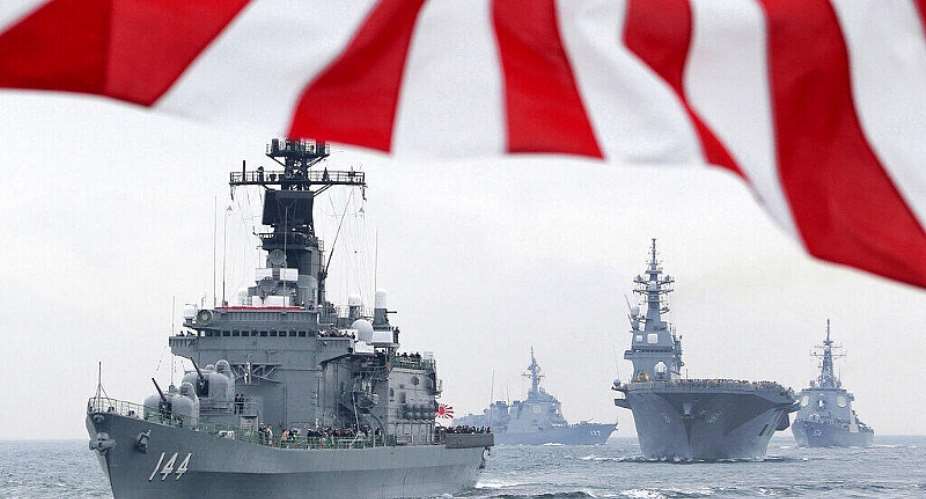The United States and Japan have unveiled plans to strengthen their military alliance to help counter threats from North Korea and China, which they believe pose the greatest security challenges in the Asia-Pacific region.
After Japanese Prime Minister Fumio Kishida's recent trip to Paris, where he and French President Emmanuel Macron pledged increased security cooperation in what Japan calls the "free and open Indo-Pacific", Kishida headed to the Americas, where he is to meet US President Joe Biden.
Accompanying him is a delegation including Japan's minister of defence, Hamada Yasukazu, and foreign minister, Hayashi Yoshimasa.
The US visit follows the publication, on 16 December, of Japan's New Security Strategy, a 36-page document that expresses particular concern about China's increasing defence expenditure.
It also warns that Beijing is "strengthening its strategic ties with Russia and attempting to challenge the international order".
Anti-China alliance?
The Japanese paper follows the strongly worded 2022 National Defense Strategy outlined by the US Department of Defence in October, which "places a primary focus on the need to sustain and strengthen US deterrence against China".
The French Ministry of Defence published its own Defence Strategy in the Indo-Pacific in 2019, based on concerns about the "increasing strategic rivaltry between China and the US" and stressing cooperation between France and members of the Quadrilateral Dialogue or Quad, an informal alliance of the US, India, Japan and Australia that is intended to counter China's growing influence in the region.
A follow-up paper published in February 2022 by the Ministry of Foreign Affairs shows that France today has some 1,660 troops in New Caledonia and 1,180 in French Polynesia, supported by seven ships and two dozen planes and helicopters, to protect the thousands of French citizens living in the area.
But while French-Japanese ties are developing, those between Tokyo and Washington are by far the strongest in what some see as a growing anti-China alliance.
During a press conference earlier this week, US Defence Secretary Lloyd Austin said that Japan and the United States "remain united in our concern over China's destabilising actions", adding that Washington has an "ironclad commitment to defend Japan with the full range of capabilities, including nuclear".
'Dear friend'
The growing commitment by the allies to tighten strategic cooperation is countered by a steady cosying-up between China and Russia.
Russia's President Vladimir Putin and China's leader Xi Jinping pledged a "boundless friendship" during the Olympic Winter Games hosted by Beijing in February – just two weeks before Russia's invasion of Ukraine.
In spite of the global instability caused by the Ukraine war, China has never criticised Moscow.
In a video conference between the two leaders at the end of last year, Putin said that "we aim to strengthen cooperation between the armed forces of Russia and China", calling Xi a "dear friend".
For now, the two emerging power blocks seem to be drifting apart, with each side persisting in its own vision of the new world order.
The US and its allies are striving for a rules-based international order implicitly led by Washington, while China and Russia would prefer a "multi-polar world" where countries do not interfere in each others internal affairs" – two concepts that are incompatible.





 SSNIT must be managed without gov’t interference – Austin Gamey
SSNIT must be managed without gov’t interference – Austin Gamey
 Ejisu by-election could go either way between NPP and independent candidate — Gl...
Ejisu by-election could go either way between NPP and independent candidate — Gl...
 We never asked ministers, DCEs to bring NPP apparatchiks for returning officer r...
We never asked ministers, DCEs to bring NPP apparatchiks for returning officer r...
 No one denigrated the commission when you appointed NDC sympathizers during your...
No one denigrated the commission when you appointed NDC sympathizers during your...
 Used cloth dealers protests over delayed Kumasi Central Market project
Used cloth dealers protests over delayed Kumasi Central Market project
 A/R: Kwadaso onion market traders refuse to relocate to new site
A/R: Kwadaso onion market traders refuse to relocate to new site
 Dumsor: Corn mill operators at Kaneshie market face financial crisis
Dumsor: Corn mill operators at Kaneshie market face financial crisis
 Jamestown fishermen seek support over destruction of canoes by Tuesday's heavy d...
Jamestown fishermen seek support over destruction of canoes by Tuesday's heavy d...
 Election 2024: EC to commence voter registration exercise on May 7
Election 2024: EC to commence voter registration exercise on May 7
 Public schools rebranding: We’re switching to blue and white, we’re painting all...
Public schools rebranding: We’re switching to blue and white, we’re painting all...
